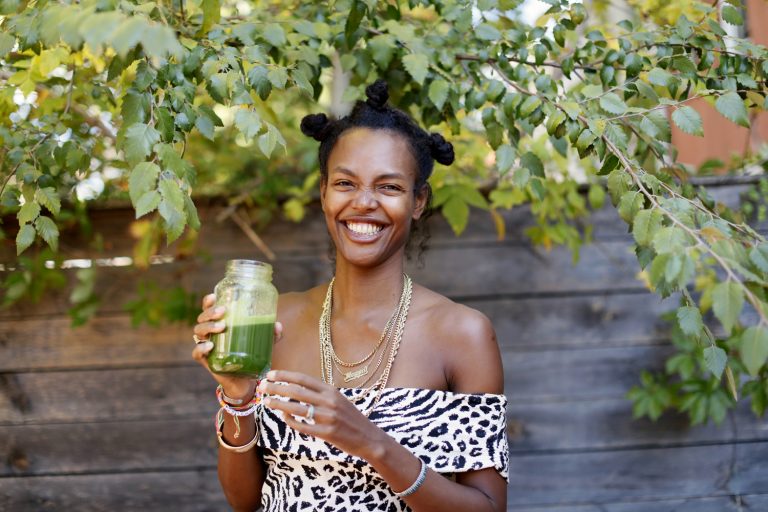
Anyone else ever feel like the day is winding down, only to look at the clock and discover it’s only 3 p.m.? You know what I mean by the dreaded afternoon slump—that inevitable drop in energy that makes it impossible to get any more productive work done. It’s pretty much a daily occurrence for me, and I have to admit it—I’m getting tired of feeling tired.
I treat my morning coffee routine like a ritual. And while the caffeine boost is nice first thing, I’m wary of drinking it past noon (I’ll do anything in the name of a good night’s sleep.) So what’s a girl to do—have an ice bucket at the ready to dump on my head every time my energy wanes?
The day I started researching the afternoon slump phenomenon, this reel about eating to fuel your energy popped up on my feed. Immediately, I reached out to Integrative Nutrition Health Coach Georgia Perkins for her advice. After all, it was her account that encouraged me to set a curfew for coffee in the first place. From understanding our hormones and the effects of our diets to energy-boosting snack recommendations, we’re breaking down how to boost your energy and beat the afternoon slump once and for all. Tips, tricks, and treats await.
P.S. If you don’t follow Goodness with G on Instagram, you’re missing out on helpful health information presented in holistic and humorous ways. I’m always looking for accounts with content that inspires me to drink more water, move my body, and take care of myself.
Feature image by Teal Thomsen.
What causes the dreaded afternoon energy slump?
While there are many factors that contribute to the afternoon slump, according to Perkins, cortisol is a major player. A stress hormone, cortisol increases glucose in the bloodstream and the brain’s use of glucose, which can affect your mood. It’s naturally highest in the morning and slowly begins to decline as the day goes on, causing your energy to dip. Besides hormonal changes, Perkins notes that everything from a lack of balanced meals and regular movement to increased stress and disruption in your sleep cycle can contribute to an afternoon energy slump.
How do we beat the afternoon slump and boost our energy?
Of course, the key to feeling more awake during the day starts with getting the best sleep you can at night. Perkins explains that “improving sleep hygiene by sleeping and waking at the same time each day and limiting electronics an hour before bed can make a huge difference” in your energy.
After you get a good night’s sleep, Perkins recommends “fueling your body intentionally with whole, real foods, including quality protein and healthy fats.” It makes sense that balanced meals help balance your blood sugar, and therefore provide long-lasting, consistent energy throughout your day. For more on natural ways to boost your energy, Perkins takes a deep-dive into the topic here.
What should we avoid eating/drinking during an afternoon slump?
Though it may seem counterintuitive, coffee and sugar are not the answer. It’s only natural to want to reach for a second or third cup of coffee when you feel your energy start to fade, but Perkins warns that “this habit can set us up for both a dependence on these substances and a harder time falling asleep later on.” Similarly, “sweet, energy-dense snacks like muffins or cookies might sound like a good idea in the mid-afternoon (and it makes sense—we digest these quickly and they provide a fast boost), but they only lead to another blood sugar dip.” Blood sugar spikes caused by foods that are high in refined carbohydrates and sugar can definitely provide a short burst of energy, “but they inevitably result in a blood sugar dip that leaves us tired and often even hungrier,” Perkins notes.
What tips and tricks can help boost your energy throughout the day?
- Physically get up out of your space and move around. Perkins notes that this is especially important if you’ve been sitting at a desk all day. While taking a quick walk around the block is ideal, even a lap or two around the office can help. “Not only does exercise help stabilize your blood sugar, but activity also increases production of serotonin and dopamine, the feel-good neurotransmitters produced in your brain and gut.”
- Stay hydrated. When your body is lacking fluids, one of the first symptoms is fatigue. It’s a simple reminder, but hydrating is one of the easiest ways that Perkins recommends to help you feel more energetic.
- Choose the right foods. Whether it’s a snack or a meal, it’s important to be conscious of the quality of the energy the food you choose will give you. Perkins recommends opting for foods with a lower glycemic index. This means that they’re digested slower, cause a lower spike in blood sugar, and provide more long-lasting energy. See below for snacks-piration.
Snacks that aid in boosting/sustaining energy naturally
What’s your go-to trick to boost your energy during an afternoon slump?